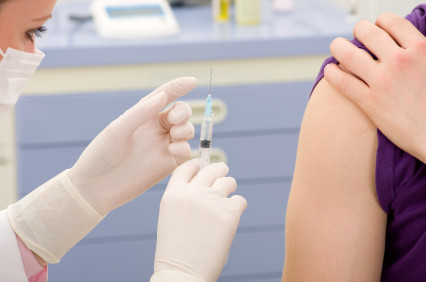Vaccinations: More than just kid stuff

Follow me on Twitter @RobShmerling
This is the time of year when it's important to think about flu vaccinations. And there's good reason for that! The flu causes thousands of preventable hospitalizations and deaths each year.
But what about other vaccinations? Do you think of them as something for kids? You aren't alone. And it's true, a number of vaccinations are recommended for young children as well as preteens and teenagers. These vaccinations have provided an enormous benefit to public health by preventing diseases that were common and sometimes deadly in the past, including polio, rubella, and whooping cough.
But there are several vaccinations recommended for healthy adults as well. And over time, these recommendations change. Here is a quick rundown.
Vaccinations for adults
According to the CDC, adults should consider receiving vaccinations to prevent
- influenza (during the fall and winter)
- tetanus
- a certain type of bacterial pneumonia (called pneumococcal pneumonia)
- shingles
- meningitis.
In addition, adults should have vaccinations to prevent a number of infections if they were not received during childhood. Examples include the MMR vaccine (for measles, mumps, and rubella), HPV (human papilloma virus), chickenpox, and hepatitis.
Additional or earlier vaccinations may be recommended if you have certain medical problems, such as having an immune system weakened by illness or medications.
New recommendations
Mumps
In recent years, cases of mumps have spiked in the US. In 2015, there were about 1,300 cases reported. In 2016, the number jumped to more than 6,300. And as of November 2017, more than 4,600 cases were diagnosed. College campuses have been particularly prone to outbreaks. Mumps threatened to disrupt graduation at Harvard University in 2016, and recently Syracuse University, the University of Missouri, SUNY New Paltz, and Tufts University have reported outbreaks. We haven't seen numbers like this since routine measles-mumps-rubella (MMR) immunizations began in the 1970s.
Although mumps is usually more of an annoyance than a serious illness, in some cases it may cause hearing loss, encephalitis (inflammation of the brain), and even death.
The rise in cases of mumps is not necessarily due to people not getting recommended vaccinations. The fact is, protection provided by vaccinations tends to wane over time. As a result, an expert panel has recommended that those at high risk for mumps get a booster shot. This includes anyone who has been in contact with someone who developed mumps. Others at higher than average risk include young adults ages 17 to 21 who spend time in close quarters, such as college students, church groups, and sports teams.
Shingles
Shingles is a re-activation of chickenpox, so anyone who had chickenpox in the past is at risk. Many who don't recall having chickenpox have been exposed to the virus that causes it and are at risk as well.
Symptoms of shingles include an itchy, burning rash over a patch of skin lasting up to 10 days. Complications include vision loss (if the skin near the eye is affected), pneumonia, and chronic pain in the area of the rash (called post-herpetic neuralgia). Shingles tends to occur in older adults, affecting an estimated one in three people over a lifetime.
Since 1995 a vaccination has been available for chickenpox, so the incidence of shingles should fall dramatically in future generations. But in 2006, a vaccine was approved to prevent shingles for those who already had chickenpox. More than 20 million people have received this vaccine.
In October 2017, a new and more effective shingles vaccine called Shingrix was approved, leading an expert panel to recommend that people over age 50 get this new shingles vaccine even if they've already had the old one. As a next step, the CDC will review this recommendation and issue its own guidelines. Health insurance coverage for this new vaccine may vary, so it's worth checking on that before getting it.
How to keep track of your vaccinations
It can be hard to remember which vaccinations you've had and when. Your primary care doctor should keep a running list in your medical record. But it's a good idea to keep your own list. Each time you get a vaccination, put it in your smartphone or keep an updated record on your computer. There are apps and programs that can make it easy, but I just enter each vaccination I receive in my cellphone's Contacts list under "Health Information."
Keep in mind that no matter how hard you try to follow recommendations regarding adult vaccinations, the recommendations may change over time. So, at your routine checkups, ask your doctor if you should receive any vaccinations. It might be the most important thing you can do for your health.
About the Author

Robert H. Shmerling, MD, Senior Faculty Editor, Harvard Health Publishing; Editorial Advisory Board Member, Harvard Health Publishing
Disclaimer:
As a service to our readers, Harvard Health Publishing provides access to our library of archived content. Please note the date of last review or update on all articles.
No content on this site, regardless of date, should ever be used as a substitute for direct medical advice from your doctor or other qualified clinician.
















